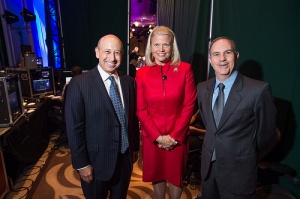Ginni Rometty on the woman behind the Most Powerful Woman
Ginni Rometty, CEO and now Chairman of IBM, is Fortune’s 2012 Most Powerful Woman. But like many of the people on that list, there was an even more powerful woman behind her mom.

Goldman Sachs’ Lloyd Blankfein, IBM’s Ginni Rometty and Fortune’s Andy Serwer backstage at MPW.
A single mother who hadn’t finished college, and struggled to raise four children, Rometty’s mom led by example. “Mom taught us by her actions,” she said, about watching her work at night so she could go to school by day. “What she taught us she never said. Actions speak louder than words and to this day I think about that. Also, I learned that nothing’s insurmountable. I will be forever grateful to her.”
Asked by Fortune Senior Writer Jessi Hempel to reflect on her first year at the helm, Rometty called it “humbling,” but says she’s been able to crystallize how she sees the long-term—which for a company like IBM (IBM), means a very long time indeed. “I believe that the idea of strategic beliefs may be more important than strategic planning when thinking about how you keep the long view,” she said. “Clients say what’s your strategy, and I say, ask me what I believe first. That’s a far more enduring answer.”
One thing she believes strongly is that we are entering a new era of cognitive computing. The first era of computing was about tabulating, followed by the era of programming. “In this third era,” Rometty says, “you won’t be able to program a machine for everything it should know. These machines will have to learn what is right and what is wrong. That’s cognitive.”
The best example of this era is IBM’s own Watson, the Jeopardy-playing computer that became a global celebrity last year. So what’s Watson doing now? “Going to medical school,” says Rometty, who says that the computer has, amazingly, “ingested 80% of the world’s medical data.” Starting with oncology, Watson is now actually able to consult with doctors on making diagnoses. “It’s almost as if he’s talking to a colleague,” says Rometty. “We shouldn’t even call it a machine.”
For now, Rometty has 400,000 employees to manage. One wonders after hearing about Watson, how many of them will be human beings in the years to come.
By Jennifer Reingold
Source: http://management.fortune.cnn.com








